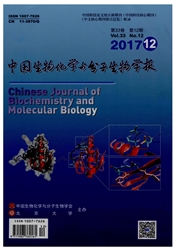

 中文摘要:
中文摘要:
血管生成素是核糖核酸酶A超家族成员之一,具有较弱的核糖核酸酶活性.最新研究发现,血管生成素参与细胞内多种RNA的代谢过程.在生长条件下,血管生成素可以发生核转位聚集于细胞核中,促进rRNA转录,并可参与其剪切加工,同时它也调控一系列mRNA基因的转录,最终促进细胞的生长和增殖;在应激条件下,血管生成素能降解tRNA形成tiRNA,抑制细胞内整体蛋白质的翻译水平,并促进应激小体的形成,激活细胞内应激保护机制,从而促进细胞存活.此外,血管生成素还可参与非编码小RNA等RNA代谢过程.本文概述了血管生成素在RNA代谢中的作用与分子机制等方面的进展,并探讨了其在疾病发生和发展中的作用,以期开拓血管生成素的研究新思路.
 英文摘要:
英文摘要:
Angiogenin, a member of the ribonuclease A superfamily, is the first identified human tumor derived protein that stimulates blood vessel growth. Despite only retaining 10.6 fold the activity of ribonuclease A, the weak ribonucleolytic activity of angiogenin is critical for its biological functions. A series of recent studies have highlighted that angiogenin contributes to the cellular RNA metabolism. Under growth conditions, angiogenin is translocated into the nucleus, enhances rRNA transcription, cleaves the 47S pre-rRNA at A0 site, and regulates the mRNA transcription as well, thus facilitating cell proliferation. Under stress conditions, angiogenin modulates the production of tiRNA, inhibits protein synthesis, and promotes cytoplasmic stress granules assembly, thus activating a cytoprotective stress response program to preventing cell apoptosis. Furthermore, angiogenin is also involved in other RNA metabolism, such as small non-coding RNA biogenesis. In this review we will discuss the current knowledge of angiogenin in RNA metabolism, explore its role in disease occurrence and development, and give fresh perspectives on the further investigation of angiogenin.
 同期刊论文项目
同期刊论文项目
 同项目期刊论文
同项目期刊论文
 Ribonuclease like 5 regulates zebrafish yolk extension by suppressing a p53-dependent DNA damage res
Ribonuclease like 5 regulates zebrafish yolk extension by suppressing a p53-dependent DNA damage res Phospholipid scramblase 1 functionally interacts with angiogenin and regulates angiogenin-enhanced r
Phospholipid scramblase 1 functionally interacts with angiogenin and regulates angiogenin-enhanced r Reduction of AUF1-mediated follistatin mRNA decay during glucose starvation protects cells from apop
Reduction of AUF1-mediated follistatin mRNA decay during glucose starvation protects cells from apop MicroRNA-409-3p suppresses colorectal cancer invasion and metastasis partly by targeting GAB1 expres
MicroRNA-409-3p suppresses colorectal cancer invasion and metastasis partly by targeting GAB1 expres Identification of estrogen receptor-related receptor gamma as a direct transcriptional target of ang
Identification of estrogen receptor-related receptor gamma as a direct transcriptional target of ang 期刊信息
期刊信息
